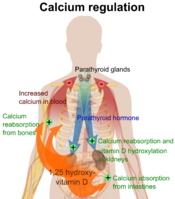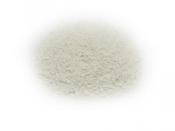Parathormone (PTH) is a polypeptide of 84 amino acids that is produced and secreted by parathyroid chief cells. PTH regulates the concentration of calcium ions (Ca2+) in the blood, this is important because Ca2+ is need for proper muscle and nerve function. Low calcium blood levels (hypocalcemia) cause muscle spasms, tetany and cardiac problems. PTH also regulates blood phosphate and magnesium levels. High blood calcium levels (hypercalcemia) with high blood phosphate levels can cause precipitation of calcium phosphate leading to organ damage.
Low blood calcium causes more parathormone production and secretion while high blood calcium does the opposite. Low blood calcium concentrations are detected by calcium receptors in the membranes of the parathyroid glands. These receptors are of the G protein receptor family, activating this receptor leads to production of second messengers and reduces the concentration of intracellular cAMP by inhibiting adenylate cyclase - this leads to physiological change in the cell which then starts secreting parathormone into the blood.
Parathormone travels to the bones where it stimulates osteoclasts (cells responsible for absorbing and removing bone tissue) to release calcium and phosphate from the bones back into the blood. PTH also travels to the kidneys where it induces the conversion of vitamin D into its active form. The active form vitamin D then travels to the intestinal epithelial cells where it induces the production of calcium-binding proteins, thereby increasing calcium absorption. PTH also travels to the kidneys where it increases calcium reabsorption; therefore less calcium is lost in the urine. Another effect PTH has on the kidneys is the reduction of reabsorption of phosphate; therefore more phosphate is lost through urine. This raises the blood calcium levels because increased phosphate in the blood causes extracellular calcium to be deposited in the bone - PTH eliminates extra phosphate to...



Toothbrush
thats why they put more and more calcium in the toothbrush, don´t they?
anyway, good resarch on that theme. well written.
1 out of 1 people found this comment useful.